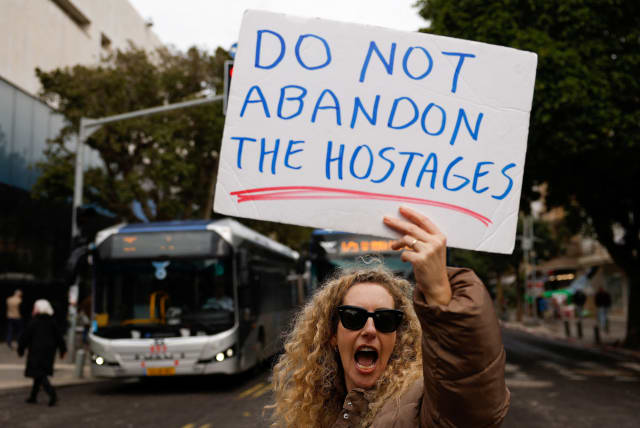Qatar warns major Rafah operation would harm hostage talks

Barnea returned from Doha and immediately updated the war cabinet on a potential hostage deal in exchange for Palestinian prisoners.
A major Rafah military operation would make it difficult to continue ongoing hostage talks in Doha, Qatar warned on Tuesday, as US Secretary of State Antony Blinken heads to the region to advance a deal.
“Any operation in Rafah right now will be a humanitarian catastrophe,” Qatari Foreign Ministry spokesman Majed Al Ansari told reporters.
There is no direct link between the hostage negotiators in Qatar and a pending IDF military operation in Rafah, but Israel has used the threat of one as a pressure lever to advance a deal to secure the release of the remaining 134 hostages.
A major Rafah operation before a deal, however, is expected to harm the talks.
“Any escalation on the ground has its bearing on the talks,” Ansari said, and one of such a magnitude as Rafah “will have a very serious bearing on the talks themselves.” In that situation, it would be difficult for negotiations to continue, he added.
Updating the war cabinet on the current state of the hostage deal
Serious talks resumed in Qatar on Monday. The Israeli delegation that participated in the talks was led by Mossad Director David Barnea, who returned to Israel on Tuesday and updated the war cabinet, KAN News reported.
The Israeli team remained in Qatar to hammer out the differences between their positions and those of Hamas with officials from Qatar and Egypt.
Both countries are mediating a deal that would see some 40 hostages freed in exchange for a six-week pause to the war and the release of Palestinian security prisoners and terrorists.
The process is expected to be plodding and could take several weeks.
Ansari said he was “cautiously optimistic,” adding that it was “still too early to claim any particular success.” The most important indicator of progress was that the talks were ongoing, he said.
The conversation at this point is over the humanitarian pause and what is expected to be three phases of an agreement.
Ansari said the issue of a permanent ceasefire would come up only in the second phase. Right now, the focus is on the first phase and the humanitarian pause, he said.
During a press conference in the Philippines, Blinken said he planned to travel to Saudi Arabia and Egypt this week. On his agenda was a “push for an agreement on a ceasefire and the release of hostages.”
“As you know, we’re intensely engaged on that every single day,” he said. “We’re doing everything we can to push that forward and to reach an agreement.”
Jerusalem Post Store
`; document.getElementById("linkPremium").innerHTML = cont; var divWithLink = document.getElementById("premium-link"); if (divWithLink !== null && divWithLink !== 'undefined') { divWithLink.style.border = "solid 1px #cb0f3e"; divWithLink.style.textAlign = "center"; divWithLink.style.marginBottom = "15px"; divWithLink.style.marginTop = "15px"; divWithLink.style.width = "100%"; divWithLink.style.backgroundColor = "#122952"; divWithLink.style.color = "#ffffff"; divWithLink.style.lineHeight = "1.5"; } } (function (v, i) { });

